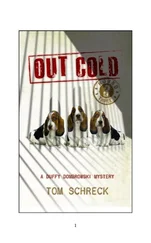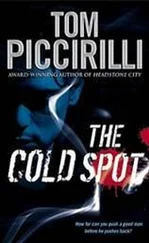I ran round the side of the farm, scrambling over the low sod walls that marked out the home pasture, and reached Sturla just in time to see him step forward holding a weapon that I vaguely recognised. It was a thin, flat board, about as long as a man's arm, and I had first seen it when the Skraelings attacked us in Vinland and, most recently, it had appeared in my nightmare. It was a spear thrower. Where Sturla had obtained this device I do not know. But he knew how to use it, for he ran forward until close enough to the rampart to deliver an accurate strike. Ospak must not have known what Sturla was carrying because when he saw Sturla come so close, Ospak jumped up on the lip of the rampart, made an obscene gesture, and raised a large rock above his head with both hands, ready to toss it on Sturla's head. Ospak was wearing protective armour that few Icelanders could afford — a thigh-length shirt of chain mail, which protected almost his entire body. But the action of raising the rock lifted the skirt of the chain mail and exposed his upper thigh. Seeing his target, Sturla swung the spear thrower in its arc and delivered its projectile. The spear shot upward. The iron head of the spear was long and slender, with two small flanges to serve as wings. Behind it uncoiled a loop of line. The spear's point passed clean through Ospak's thigh and, as he staggered, Sturla gathered the line in both hands and gave a tremendous jerk. Like a fish that has been harpooned, Ospak was literally plucked off the wall and pulled down to the ground. Gesturing to his companions to stand back, Sturla ran forward, drew his dagger and stabbed Ospak through the heart.
The death of their leader ended all resistance from Ospak's gang. They lowered their weapons and began shouting out that they would leave the building if they were allowed to go unharmed. A moment later the double gates of the stockade were tugged open. Snorri, Sturla and the rest of us walked into the compound to find the bandits looking frightened and exhausted. Hrafn, Ospak and one other man were the only fatalities, but many of the defenders had minor wounds and bruises. Snorri kept his word and was remarkably lenient with their punishment. He held a brief court hearing on the spot, and in his capacity as the local godi condemned the worst culprits to exile. He did not have the power to exile them from Iceland, but he could forbid them to come ever again into Westfjords on pain of being prosecuted as full outlaws at the next Althing. The men were obliged to leave their weapons behind and quit the farm immediately, never to return. Snorri treated Ospak's widow and son magnanimously. The widow, he said, had not had any choice in her husband's behaviour, and though the son had fought in the defence of the farm, he was honour-bound to do so for his family's reputation. He had not been involved in his father's brigandage, and in consequence Snorri pronounced that the widow and son could continue in possession of the farm and its lands.
Thrand Stigandi stayed on at Snorri's farm for several weeks after Ospak's defeat at the battle of Bitra, as it came to be called, and there were many who came to congratulate him on his bravery and some, more discreetly, to thank him for interceding with Thor on behalf of the law-abiding people of the Westfjords. Snorri must have told Thrand about me and I was flattered when Thrand beckoned to me one evening as supper was being cleared from the table and led me to a quiet corner, where we could not be overheard. He sat down on a storage chest and said in his deep,
husky voice, 'Snorri tells me that sometimes you see things which others cannot see.'
'Yes, occasionally,' I replied, 'but I don't understand what I am seeing, and I never know when it will happen.'
'Can you give me an example?' he asked.
I thought of Snorri's warning never to reveal dreams of death to anyone, but the events were in the past and Snorri had assured me that Thrand was seidr-skilled so I told him about my dream of the battle at Ospak's farm, the owl-headed man, and the rest.
Thrand did not interrupt, and when I had finished my account, he said, 'And how many days before the fight did you have this dream?'
'Soon after your arrival here, on the night after you and Snorri spent so much time in Thor's temple,' I answered.
'I wonder if you would have had the dream earlier, in the temple itself, if the conditions had been right,' Thrand commented, almost speaking to himself. 'Some seers are lucky. Dreams come to them so easily that they need only to withdraw to some quiet place, close their eyes and empty their minds, and the visions enter their consciousness. Others must get fuddled on strong drink, or chew strong weeds, or breathe the smoke of a sacred fire, or listen to sacred chants repeated over and over again until their spirit floats free from their body.'
He got up and went to where his sword and helmet were hanging from a peg on the wall. He brought them over and showed the flat of the sword's blade to me. 'What does that mean?' he asked.
The runes were easy to decipher and simple. 'Ulfbert made,' I replied.
'Now, what about this?' he continued, holding out his antique helmet with its quaint eye protectors. He had turned the helmet upside down so I could see inside the metal bowl. From the centre, radiating down to each side, was incised a plain, thin cross, its arms ending in arrow heads which pointed back towards the intersection.
'That's the aegishjalmr,' I said, 'the helm of awe.' 'Yes,' replied Thrand, 'but what about the marks around the edge?'
I looked more closely. Around the inner rim of the helmet I could see a number of small scratches. They were badly worn, but they had been put there deliberately. Several of them I recognised immediately as rune staves in the futhark, but others were more difficult to decipher. I ran my finger round them, to feel their shapes, as Tyrkir had taught me. Several I identified as letters which Tyrkir had said were little used nowadays. In the end, I did manage to puzzle them out.
'I don't know what it means, but if I try to read out the message it would sound something like . . . a g mod den juthu pt fur . . . but I cannot be sure.'
Thrand looked thoughtful. 'No more than half a dozen people in Iceland know how to read the archaic runes,' he said. 'That's galdrastafir — rune spell. It was put there soon after the helmet was forged, and the staves make the helmet a talisman against harm to the wearer, as well as a physical protection. I would never exchange this antique helmet for a modern one. Who taught you the archaic runes?'
'An old German, a metalsmith named Tyrkir, instructed me in how to read and cut rune staves while I was in Greenland.'
Thrand said solemnly, 'The message you carve in runes is more important than just knowing what each stave represents. Quite a few people know how to carve their name, but only the initiated know the spells and charms and curses that can be written. Odinn showed rune writing to mankind and now it is merely a matter of passing the knowledge from one person to the next.'
He seemed to make up his mind about something, turned towards me and, speaking to me as if I was an adult and not a fourteen-year-old lad, he went on:
'The greatest and most profound visions require pain and sacrifice. Odinn gave one of his eyes in order to drink from the fountain of Mimir and learn the secret wisdom which allows the Gods to survive. He also impaled himself on a spear and hung for nine days from Yggdrasil, the world tree, in order to learn the secret of the runes. Only through the sacrifice and pain could he open his mind and spirit to wisdom. That is one thing which distinguishes us from the Christians. They believe that the soul lives in the heart, but we hold that it resides in the mind, and that when the mind is set free the spirit also is liberated.'
Читать дальше








